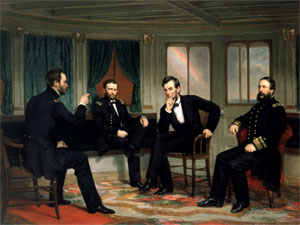

Most historians rank as either the greatest or second greatest president in U.S. history (withInteractive popup. Assistance may be required. in the other spot). His political career had a meteoric rise. In the mid-1850s, he was a relatively obscure Congressman and country lawyer known for his sharp wit and folksy arguments. Lincoln became a leader in the young Republican Party after narrowly losing a senate election to in 1858, captivating the nation with a series of debates over slavery. Still, he was the surprise nominee of the Republicans in 1860 and won the presidency despite earning only 40% of the popular vote and winning no Southern states.
As president, Lincoln endured numerous bloody failures on the battlefield, yet resisted all pressure to negotiate with the South. He knew the Union must be preserved, at all costs. Though he did not promise to free the slaves during his run for the presidency, his Emancipation Proclamation made the Civil War a great moral struggle for both democracy and freedom.
![]() Click on the three pictures below to learn essential aspects of Lincoln's leadership.
Click on the three pictures below to learn essential aspects of Lincoln's leadership.
Sources of images used for this section as they appear, top to bottom: